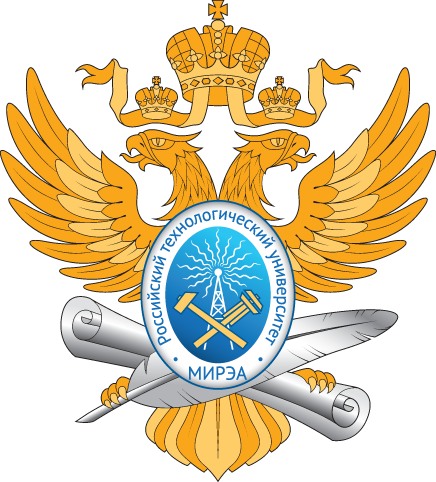18.04.01 Chemical technology

Depending on the selected master's program, students study chemical technology of macromolecular and organoelement compounds, chemical technology for processing plastics, composite materials and elastomers, chemical technology of rare and platinum metals, chemistry and technology of biologically active substances, chemical technology of materials for electronics and alternative energy, chemistry and technology of products of basic organic and petrochemical synthesis, theoretical foundations and engineering of energy-saving technologies of organic substances, and more.
Level of education:
Masters’s degree
Form of training:
Full-time (day department)
Venue of training:
Moscow
Entrance exams:
— Chemistry
Programs, specializations:
Theoretical foundations and engineering of energy-saving technologies of organic substances
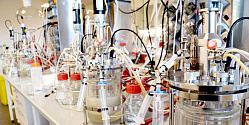
The program is focused on the study of the theoretical foundations of chemical technology as a fundamental component of chemical engineering science, basic processes and devices of chemical technology, as well as information systems for supporting technological solutions.
The content of the program is based on the results of the activities of Russian academic schools that rank even higher than foreign research schools in this area. Undergraduates receive in-depth training in the development and analysis of promising chemical and technological systems. Students study using modern software systems to make physiochemical calculations, calculations for equipment and technological schemes; they have licensed access to databases of physiochemical properties, and acquire skills in the development and implementation of information technologies and systems in the chemical industry.
This is one of the most practice-oriented master's programs tailored to the needs of specific employers.
The content of the program is based on the results of the activities of Russian academic schools that rank even higher than foreign research schools in this area. Undergraduates receive in-depth training in the development and analysis of promising chemical and technological systems. Students study using modern software systems to make physiochemical calculations, calculations for equipment and technological schemes; they have licensed access to databases of physiochemical properties, and acquire skills in the development and implementation of information technologies and systems in the chemical industry.
This is one of the most practice-oriented master's programs tailored to the needs of specific employers.
Alumni can be employed as
- chemist-technologists
- chemical engineers
- engineers-chemical technologists
- researchers
- heads or specialists of it departments of a chemical enterprise
- research engineers at research institutes and cpl
- teachers at secondary and higher educational institutions
Program subjects
- Mechanisms and kinetic models of catalytic reactions
- Thermodynamic-topological analysis of phase diagrams and separation processes
- Phenomena of energy and mass transfer in continuous media
- Chemical technology of organic substances
- History and methodology of chemical technology
- Information Modeling
• Department of Chemistry and Technology of Basic Organic Synthesis
• Department of Processes and Apparatus of Chemical Technology named after N.I. Gelperin
Chemical technology of macromolecular and organo-element compounds
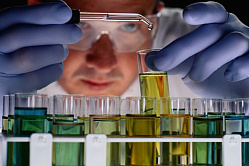
The professional activity of those who take masters’ program includes the study of means and methods for obtaining substances and materials with the use of physical, physiochemical processes, the development of products for various purposes on their basis, as well as the creation, implementation and operation of production of construction and polymer materials. Students study the processes of obtaining monomeric and polymeric organo-element and high-molecular compounds which are widely used in various chemical engineering processes. The program includes the specifics of various mechanisms in the formation of macromolecular compounds, their kinetic models, as well as the chemistry and technology of obtaining organo-element compounds and modern materials based on them, including nanocomposites, products for biomedicine, mechanical engineering, and the defense industry.
Alumni can be employed as
- engineers of technical department of enterprises for the production and processing of polymeric materials
- research engineers
- chemical engineers
- process engineers
- designers of chemical plants
- technologists
Program subjects
- Theoretical foundations of polymer synthesis
- Technology of organoelement compounds
- Chemistry and technology of organometallic compounds
- Synthesis of reactive oligomers and polymers based on them
- Biocompatible and biodegradable polymers
- Chemistry of organoelement compounds
- Methods of research of organoelement compounds
- Synthesis of polymers with special properties
- Properties of organoelement compounds
- Kinetic and thermodynamic approach to polymer synthesis processes
- Educational communications
- Synthesis and transformation of organosilicon heterocumulenes
- Methods of research of polymers
• Department of Chemistry and Technology of Macromolecular Compounds named after S.S. Medvedev
• Department of Chemistry and Technology of Organoelement Compounds named after K.A. Andrianova
Chemical technology for processing plastics and composite materials
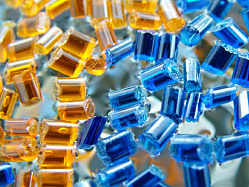
The program is aimed at those who want to develop modern polymeric materials, nanocomposites, reinforced plastics and create products from them with unique complexes of properties; is one of the most practically oriented, since today there is no industry that does not use polymeric materials and / or products from them.
Undergraduates are trained in physical chemistry and study the principles of developing composite polymer materials, technology for the manufacturing of products and composite materials, the design of plastic products and molding equipment, modeling the processes to obtain and process plastics; they learn the fundamentals of design and equipment for enterprises processing plastics, and get to know instrumental research methods.
Students receive theoretical knowledge and practical skills in creating and processing polymer materials, nanocomposites and reinforced plastics, manufacturing products with a unique set of performance properties. The undergraduates of the program have access to modern educational and training laboratories, gain practical experience in research and technological equipment. The training is tailored to the needs of specific employers.
Undergraduates are trained in physical chemistry and study the principles of developing composite polymer materials, technology for the manufacturing of products and composite materials, the design of plastic products and molding equipment, modeling the processes to obtain and process plastics; they learn the fundamentals of design and equipment for enterprises processing plastics, and get to know instrumental research methods.
Students receive theoretical knowledge and practical skills in creating and processing polymer materials, nanocomposites and reinforced plastics, manufacturing products with a unique set of performance properties. The undergraduates of the program have access to modern educational and training laboratories, gain practical experience in research and technological equipment. The training is tailored to the needs of specific employers.
Alumni can be employed as
- researchers
- technologists for processing plastics
- research engineers
Program subjects
- Structure and mechanical properties of polymers and polymer compositions;
- Principles of creating composite materials and nanocomposites;
- Instrumental physiochemical methods of polymer research;
- Modern polymeric materials;
- Technology for the production of polymer composite materials;
- Technological processes for the production of plastic products and polymer composite materials
- Calculation and design of plastic products and forming tooling;
- Mathematical methods in plastics processing;
- Heat transfer processes, rheology and macro-kinetics in polymer processing technology
- Hardware and design fundamentals for enterprises for the processing of plastics and polymer composite materials
- Scientific basis for creating mixtures and alloys of polymers
Department of Chemistry and Technology of Plastics and Polymer Composites Processing
Chemical technology of rare and platinum metals
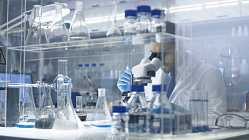
This master's program is aimed at those who are interested in methods and technologies for obtaining rare, scattered and platinum metals from primary and secondary raw materials, as well as targeted synthesis of new generation functional materials based on rare and platinum metals.
During the training process, students receive theoretical knowledge and practical skills to work as researchers and technologists who have the necessary background and competencies to work in research institutes and large industrial enterprises.
It should be noted that the program is the only one of the kind in Russia: specialists are trained to work in chemical technology of platinum metals.
During the training process, students receive theoretical knowledge and practical skills to work as researchers and technologists who have the necessary background and competencies to work in research institutes and large industrial enterprises.
It should be noted that the program is the only one of the kind in Russia: specialists are trained to work in chemical technology of platinum metals.
Alumni can be employed as
- chemist-technologist
- research engineer
- researcher
Program subjects
- Chemical technology of minor metals
- Chemical technology of platinum metals
- Theory of pyro- and hydrometallurgical processes
- Chemistry of coordination compounds of rare and platinum metals
- Research methods
- Functional materials based on rare and platinum elements, methods of obtaining
- Special methods for obtaining materials, including nanoscale
Chemistry and technology of rare and trace elements, nanoscale and composite materials. K.A. Bolshakova
Chemical technology of elastomeric materials
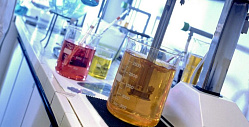
The professional activity of graduates includes methods, means and techniques for obtaining unique elastomeric materials using physical, physiochemical and chemical processes; production of rubber products and tires on their basis; creation, implementation and operation of production facilities for the manufacture of modern elastomeric materials and products based on them.
Research activities of the department are related to the development and implementation of new technologies for obtaining elastomeric compositions for biomedicine, mechanical engineering, defense industry, automobile and aircraft construction; research of adhesive processes in elastomeric materials.
Undergraduates master the fundamentals of modern compounding, technologies for creating new elastomeric materials for automobile and aircraft tires, conveyor belts, drive belts, sleeves, shock absorbers, seals, adhesives and sealants, medical products and consumer goods. Classes are held in educational and production laboratories with a modern complex of specialized equipment. In the course of training, undergraduates gain knowledge and practical skills. Training is tailored to the needs of specific employers
Research activities of the department are related to the development and implementation of new technologies for obtaining elastomeric compositions for biomedicine, mechanical engineering, defense industry, automobile and aircraft construction; research of adhesive processes in elastomeric materials.
Undergraduates master the fundamentals of modern compounding, technologies for creating new elastomeric materials for automobile and aircraft tires, conveyor belts, drive belts, sleeves, shock absorbers, seals, adhesives and sealants, medical products and consumer goods. Classes are held in educational and production laboratories with a modern complex of specialized equipment. In the course of training, undergraduates gain knowledge and practical skills. Training is tailored to the needs of specific employers
Alumni can be employed as
- heads of divisions of chemical enterprises
- engineers of technological chemical enterprises
- research engineers
- teachers of chemical disciplines in educational institutions
- specialists of the product quality department
Program subjects
- Design principles for elastomeric materials with specified properties
- Fundamentals of design and equipment for elastomer processing plants
- Technology of products manufacturing from elastomers
- Adhesion and bond strength in elastomeric systems
- Structure and properties of elastomeric materials
- Ingredients and reinforcing materials for the production of elastomer products
- Mathematical methods for planning experiments and processing experimental data in the rubber industry
- Unconventional methods of production of products from elastomers
- Technological basis for the production and use of rubber recycled
- Physiochemical principles of polymer products processing through solution
Department of Chemistry and Technology of Elastomer Processing named after F.F. Kosheleva
Chemistry and technology of biologically active substances
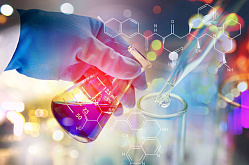
The training program is intended for those who are interested in solving complex professional problems in research and academic-pedagogical activity relating to the use of chemical phenomena and processes, the development and research of biologically active and medicinal substances, methods and technologies for obtaining biologically active substances and medicinal products with the use of chemical and biotechnological processes.
The objects of professional activity of graduates are biologically active substances of a complex structure with potential biological and medicinal activity, physicochemical and biochemical methods for studying the structure and properties of biologically active substances, technological processes for obtaining drugs.
An important feature of the program is close integration of the students’ educational and research activities carried out at the graduating department in close cooperation with the leading research institutes of the Russian Academy of Sciences, which, along with modern educational technologies, provides a high level of professional training of graduates of the masters’ program, allows them to gain valuable practical experience in research laboratories, and develop creativity and analytical skills.
The objects of professional activity of graduates are biologically active substances of a complex structure with potential biological and medicinal activity, physicochemical and biochemical methods for studying the structure and properties of biologically active substances, technological processes for obtaining drugs.
An important feature of the program is close integration of the students’ educational and research activities carried out at the graduating department in close cooperation with the leading research institutes of the Russian Academy of Sciences, which, along with modern educational technologies, provides a high level of professional training of graduates of the masters’ program, allows them to gain valuable practical experience in research laboratories, and develop creativity and analytical skills.
Alumni can be employed as
- chemists
- chemist-technologists
- researchers
- research engineers
- biochemists
- microbiologists
- analytical chemists
Program subjects
- Fundamentals of bioorganic synthesis
- Modern physical and chemical research methods
- Chemistry and technology of medicinal substances
- Chemistry of heterocyclic compounds
- Biochemical and molecular biological processes in drug development
- Fundamentals of pharmacology and the creation of medicinal substances
- Nanotechnology in pharmaceuticals and biomedicine
- Bioanalysis methods
- Principles for the design of anticancer drugs
- Fundamentals of immunochemistry
Department of Chemistry and Technology of Biologically Active Compounds, Medical and Organic Chemistry named after N.A. Preobrazhensky
Chemistry and technology of basic organic and petrochemical synthesis products
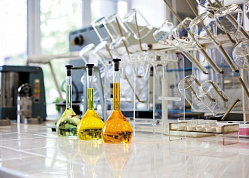
The training is focused on those students who are interested in chemical technology aimed at developing processes and industrial methods for producing organic substances, studying catalytic reactions, as well as creating methods for separating and purifying substances. The educational program is based on disciplines relating to the study of the laws of chemical reactions, catalysis, heat and mass transfer processes, mathematical modeling and, on this basis, the development of chemical technologies for obtaining a wide range of organic substances from natural or technogenic raw materials.
Students learn to conduct experimental research, propose scientifically grounded technical solutions, perform calculations, mathematical modeling and optimization of chemical engineering systems. During the training process, students receive theoretical knowledge and practical skills in developing new and improving existing technologies for organic substances. They acquire skills of experimental work, participating in joint projects with the institutes of the Russian Academy of Sciences - partners of the master's program.
The training program provides for a profound study of the theoretical foundations and the specific organization of the technological process for the production of basic organic and petrochemical synthesis, catalytic processes, and the production of carbon materials. The structure of the program provides training for students in creating new and improving existing technologies based on a systematic analysis of technological systems and their elements. Undergraduates are trained using modern equipment and licensed software systems for modeling technological schemes.
Students learn to conduct experimental research, propose scientifically grounded technical solutions, perform calculations, mathematical modeling and optimization of chemical engineering systems. During the training process, students receive theoretical knowledge and practical skills in developing new and improving existing technologies for organic substances. They acquire skills of experimental work, participating in joint projects with the institutes of the Russian Academy of Sciences - partners of the master's program.
The training program provides for a profound study of the theoretical foundations and the specific organization of the technological process for the production of basic organic and petrochemical synthesis, catalytic processes, and the production of carbon materials. The structure of the program provides training for students in creating new and improving existing technologies based on a systematic analysis of technological systems and their elements. Undergraduates are trained using modern equipment and licensed software systems for modeling technological schemes.
Alumni can be employed as
- chemist-technologist
- chemical engineer
- researcher
Program subjects
- Mechanisms and kinetic models of catalytic reactions
- Thermodynamic-topological analysis of phase diagrams and separation processes
- Chemistry of natural energy carriers
- Chemical technology of organic substances
- Applied catalysis
- Optimization of chemical technological processes
- Research methods of chemical technological processes
- Engineering of catalytic reactions
- Methods for obtaining and studying catalysts
- Graphometry of technological schemes
• Department of Chemistry and Technology of Basic Organic Synthesis
• Department of Technology of Petrochemical Synthesis and Artificial Liquid Fuel named after A.N. Bashkirova
• Department of General Chemical Technology
- Educational Activity
-
Institutes
- Institute of Information Technologies
-
Institute of Artificial Intelligence
- About the Institute
- Institute Administration
- History of the Institute
-
Training programs
- Bachelor's Degree Programs
-
Master's Degree Programs
- 01.04.02 Applied mathematics and information science
- 09.04.01. Informatics and computer engineering
- 12.04.04 Biotechnical systems and technologies
- 15.04.04 Automation of technological processes and production
- 15.04.06 Mechatronics and robotics
- 27.04.03 System analysis and management
- 27.04.04 Engineering system control
- Infrastructure
- Alumni
- Contacts
- Institute for Cybersecurity and Digital Technologies
-
Institute for Advanced Technologies and Industrial Programming
- About the Institute
- Institute Administration
- History of the Institute
-
Training programs
-
Bachelor's Degree Programs
- 09.03.02 Information systems and technologies
- 11.03.04 Electronics and nanoelectronics
- 12.03.05 Laser technology and laser techniques
- 15.03.01 Mechanical engineering
- 22.03.01 Materials science and technology
- 27.03.01 Standardization and metrology
- 28.03.01 Nanotechnology and microsystems engineering
- 29.03.04 Decorative material working techniques
- 54.03.01 Graphic design
-
Master's Degree Programs
- 09.04.02. Information systems and technologies
- 11.04.04 Electronics and nanoelectronics
- 12.04.02 Optical engineering
- 15.04.01 Mechanical engineering
- 22.04.01 Materials science and technology
- 27.04.01 Standardization and metrology
- 29.04.04 Decorative material working techniques
- 54.04.01 Graphic design
-
Bachelor's Degree Programs
- Infrastructure
- Alumni
- Contacts
- Institute of Radio Electronics and Informatics
- Institute of Management Technologies
- Lomonosov Institute of Fine Chemical Technologies
- Institute of International Education
-
Mega-Laboratories
- Motion Capture Laboratory
- Immersive Technologies Laboratory
- Laboratory for the Development and Transfer of Microfluidic Technologies (DTMT)
- Cell Technologies Megalaboratory operating on the basis of the Department of Chemistry and Technology of Biologically Active Compounds, Medical and Organic Chemistry named after N.A. Preobrazhensky
- General Biotechnology Megalaboratory
- Industry 4.0: Digital Robotized Production center
- Laboratory of Intelligent Autonomous and Multi-Agent Robotic Systems
- Research and Educational Center for Biosynthesis, Isolation and Purification of Monoclonal Antibodies (Generium)
- Rare and Precious Metals Research and Technological Center operating on the basis of the Department of Chemistry and Technology of Rare Elements named after K.A. Bolshakov
- Laboratory of Analytic, Modeling, Design and Digital Prototyping Technologies
- Import Substitution of Information Technologies Educational and scientific testing complex
- Smart Production Systems Educational and Scientific Center
- Elastomers. Thermoplastics. Technologies Educational and Research Center operating on the basis of the Department of Chemistry and Technology of Elastomer Processing named after F.F. Koshelev
- Catalytic and Mass Exchange Processes center
- Center of Innovative Technologies in Microelectronics
- Centre for Additive Polymer Technologies
- Center for Cybersports Robotics
- Mobile Robotics University Laboratory
- Radio electronic Technologies Megalaboratory
- Situation center
- Scientific and Educational Center for Medical Radiology and Dosimetry
- Laboratory of Geographic Information Systems and Technologies
- Educational and Research Center for Space Monitoring ("CosMoCenter")
- Techno-coworking
- Bachelor's Degree Programs
- Master's Degree Programs
- Additional Education Programs
- Physical Education and Sports
© 2025 MIREA - Russian Technological University
